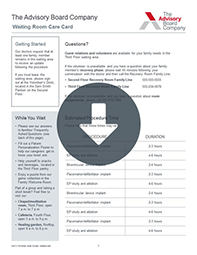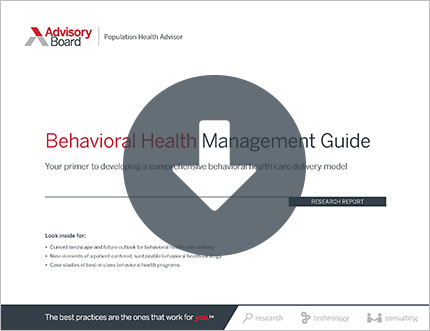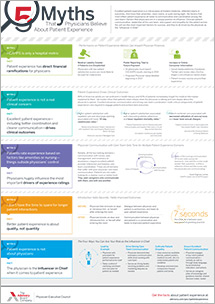Auto logout in seconds.
Continue LogoutWhen officials at Monash Health in Australia discovered they had systematically failed to spot "underlying traumas" in mental health patients, they launched an effort to foster provider-patient trust—and saw big gains in patient satisfaction scores and patient outcomes, Melissa Casey and colleagues write for Harvard Business Review.
New toolkit: 5 must-have characteristics of the consumer-focused physician
How Monash kept treating mental health patients—without ever identifying their real problem
Monash's journey began with the discovery that their clinicians had been missing "a problem hiding in plain sight," writes Casey, leader of psychological services at Monash, along with Donald Campbell, a professor of medicine at Monash, and Keith Stockman, operations manager at Monash.
The problem: Monash's mental health patients had grown increasingly likely to re-present to the hospital, even as new presentations had fallen over the previous decade.
Moreover, Monash discovered that more than half of their most frequent mental health presenters had received more than four different psychiatric diagnoses—and although they'd received treatment for each condition, they still weren't recovering.
So why was Monash failing to better serve these patients? After further analysis, Monash determined that even as doctors treated these patients' immediate symptoms, they had failed to identify the "underlying trauma."
The authors explain, "Because [Monash staff] had not been primed to attend to the significance of trauma in our patient's lives, it was hiding in plain sight from us."
How Monash invested in building more trusting relationships
The solution, Monash determined was "to build strong trust-based patient relationships with our patients," enabling providers to surface and ultimately treat patients' underlying traumas.
In particular, Monash launched two new efforts.
The first was a new practice introduced in Monash's new Agile Psychological Medicine Clinics. In each interaction, providers request feedback from their patients on treatment outcomes and their experience with providers. "This builds in an opportunity for patients to air their concerns and provide data in their own way," the authors write—which in turn forces the clinician "out of their heuristic box" and enables them to "adapt promptly to what the patient is telling them."
The effort produced significant results, the authors write. Patients treated for trauma have seen a 52% improvement in their symptoms and a 39% improvement in depressive symptoms, and the hospital has seen a 30% decrease in patients re-presenting during treatment.
Second, Monash began offering a service called Monash Watch, which provides a small group of high-risk patients with telecare guides who contact them at least once a week. Each conversation begins with the guide leading the patient through a brief script and then continues into an unstructured, patient-led dialogue.
Over time, the guides "come to know their patients as people, not just as anonymous check-a-box responses to questions," the authors write, enabling them to detect even subtle signals of worsening health, such as changes in intonation.
Further, the conversations can be recorded and analyzed by Monash-developed software called the Patient Journey Record System (PaJR), which generates an alert if the patient's health appears to be declining. If that change is confirmed, the patient will be handed off to a clinician for follow-up.
'Empathy saves not only lives but also money and time'
The significant improvements in Monash's care were only possible, Casey and colleagues write, because their providers invested in building genuine, trusting relationships with their patients.
Creating trust, they conclude, "creates the possibility of identifying underlying hidden conditions whose treatment prevents the occurrence of overt symptomatic conditions that cause distress to patients and place huge strains on the capacity of health care services. Empathy saves not only lives but also money and time. It's time to build a place for it in the clinical process" (Casey et. al., Harvard Business Review, 11/21).
5 myths physicians believe about patient experience
Excellent patient experience is a critical piece of modern medicine, reflected clearly in outcomes. And more than amenities, clean rooms, or quiet during night, the factors that most inflect patient experience all relate to communication and coordination among the care team—factors that physicians are in a unique position to influence.
Clinician-patient communication, leadership of the care team, and support and empathy for the patient across the unit are the most important factors for success, and they're all driven by the physician as the "Influencer in Chief."
Don't miss out on the latest Advisory Board insights
Create your free account to access 1 resource, including the latest research and webinars.
Want access without creating an account?
You have 1 free members-only resource remaining this month.
1 free members-only resources remaining
1 free members-only resources remaining
You've reached your limit of free insights
Become a member to access all of Advisory Board's resources, events, and experts
Never miss out on the latest innovative health care content tailored to you.
Benefits include:
You've reached your limit of free insights
Become a member to access all of Advisory Board's resources, events, and experts
Never miss out on the latest innovative health care content tailored to you.
Benefits include:
This content is available through your Curated Research partnership with Advisory Board. Click on ‘view this resource’ to read the full piece
Email ask@advisory.com to learn more
Click on ‘Become a Member’ to learn about the benefits of a Full-Access partnership with Advisory Board
Never miss out on the latest innovative health care content tailored to you.
Benefits Include:
This is for members only. Learn more.
Click on ‘Become a Member’ to learn about the benefits of a Full-Access partnership with Advisory Board
Never miss out on the latest innovative health care content tailored to you.



